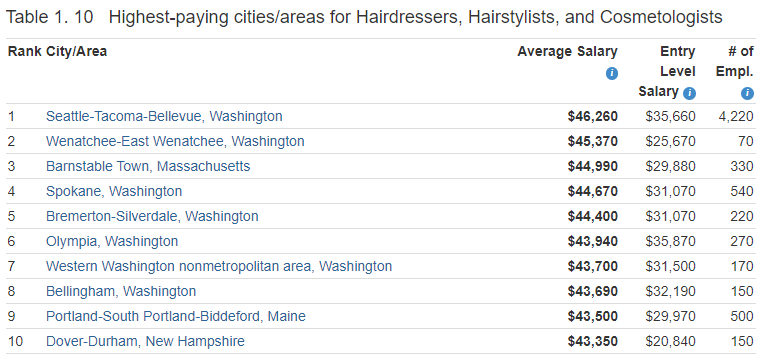Last Updated on September 12, 2024
Welcome to the exciting field of cosmetology. This article is the ideal start for understanding the various careers available within the cosmetology industry: what is suitable for you and what path you should follow to ensure you have all the training, education, and experience needed to succeed in your future career goals.
The field of cosmetology is exciting and well-suited to anyone who enjoys connecting with people, using their creativity, and helping others look and feel their best. Many roles and activities fit under the “cosmetology” category, from hairstylist to makeup artist, from nail treatments to overall health and beauty care.
Having so many paths to choose from is exciting, but it can also make it challenging to decide which will be the most fitting to you—but that’s just what this book will help you do.
A Career in the Cosmetology Industry
It is beyond the scope of this article to cover every career path involved in the beauty-related industry. We will, however, cover the most common, including.
- Hairstylist
- Nail technician
- Salon or spa manager
- Beautician
- Wedding and event stylist
- Makeup artist
- Skin-care specialist
These jobs are widely available all over the country. People are looking everywhere for stylists for everyday life and special occasions such as weddings. Makeup artists can work for the general population, photo studios, or theater.
No matter where you live, there will be people who want to look and feel their best, and for that, they will rely on talented, creative, and knowledgeable professionals who know how to really listen to what their clients want.
The good news is the industry is booming: employment for hairstylists and cosmetologists is projected to grow 8 percent from 2018 to 2028.1 That’s faster than the average for all careers in the United States. And not all of these jobs necessarily require that you have a college degree.
Population growth is also expected to boost the demand for hair care and other cosmetology-related services. So that’s all good news for the aspiring cosmetologist. With this healthy outlook, the future looks bright, as you’ll see in the following section.
Although people all over the country, from small towns to bustling metropolises, create high demand for cosmetology services, there are some areas where, statistically, cosmetology thrives more than others. The following lists the top twenty best places for hairdressers, hairstylists, and cosmetologists in the United States, according to USA Wage, including average annual salary for 2020 and average starting salary for the same year.
Source: https://www.usawage.com/high-pay/cities-hairdressers_hairstylists_and_cosmetologists.php
Educational Requirements
To launch your career in cosmetology, you will need a high school degree or equivalent, such as a General Educational Development (GED) certification. In addition, each state requires cosmetologists (including barbers and hairstylists) to complete a program in a licensed cosmetology school. These are taught in vocational schools and community colleges and typically take two years to complete. On graduation, you will receive a certificate.
However, education in cosmetology is ongoing and career-long. Many professionals continue to take courses or seminars to keep their skills sharp and stay on top of new trends and techniques. It is not a profession you want to fall behind in!
A college degree is not a requirement for a career in cosmetology, but if you are interested in pursuing a bachelor’s degree and may want to start your own business, such as a nail saloon, a degree in business or marketing will be a vital asset in helping you succeed.
Once you have completed high school, you will, at minimum, have to complete a program with a cosmetology school or community college, plus obtain a state cosmetology license. You can also pursue a four-year bachelor’s degree in any subject (there are none available in cosmetology) and then complete a cosmetology program after you earn (or while earning, if you can balance the two) your degree.
Be sure you research the basic GPA and SAT or ACT requirements of each school as well. Although some community colleges do not require standardized tests for application, others do. If you plan to apply to a college or program that requires the ACT or SAT, advisors recommend that students take both the ACT and the SAT test during their junior year of high school (spring at the latest).
You can retake these tests and use your highest score, so leave time to retake early in your senior year if needed. You want your best score to be available to all the schools you’re applying to by January of your senior year. This will also enable them to consider you for any available scholarships. Remember these are general timelines—be sure to check the exact deadlines and calendars of the schools you’re applying to!
Deciding on College (or Not)
Deciding whether or not to attend college is a very big decision. Some young people know they want to go to college. Their families probably support their choices. Their families will probably help them pay for college as well.
Other young people are ready to make money, not spend it on college. Colleges can be costly. Many schools cost $40,000, $50,000, or more a year. Although not all colleges are expensive, they may cost too much for some families.
College might not be the best place for other young people to learn. Not everyone learns best in a classroom; many people would learn by doing, not sitting in a class. And not every job can be learned in college. If you want to be a mechanic, a plumber, or a cosmetologist, you don’t need to go to college. You will need to learn many things to be good at these jobs, but you don’t have to go to a four-year college to learn them.
You have lots of choices after high school. If a four-year college isn’t right for you, maybe a technical school is. Technical schools are also called trade schools or vocational schools. At a technical school, students learn the skills and knowledge they need for a particular job.
Beauty Schools Directory
www.beautyschoolsdirectory.com/faq/cosmetologist.php
U.S. Bureau of Labor Statistics
https://www.bls.gov/ooh/personal-care-and-service/barbers-hairstylists-and-cosmetologists.htm
See also:
- State Board Cosmetology Exam Practice Test 2024 [Study Guide]
- Cosmetology Practice Test 2024 Question Answers [English Version]
- Cosmetology Practice Test Questions [Spanish Version]
- A Career in the Cosmetology Industry 2024


